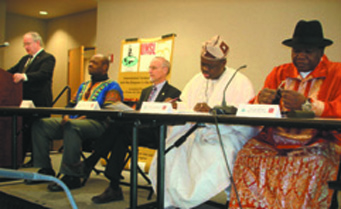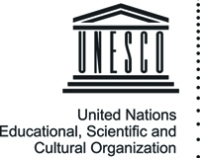 The challenges and opportunities confronting Africans and the people of African descent all over the world in the 21st Century have assumed dimensions that should provoke a comprehensive review of salient aspects of Africa’s initial response to these challenges.
The challenges and opportunities confronting Africans and the people of African descent all over the world in the 21st Century have assumed dimensions that should provoke a comprehensive review of salient aspects of Africa’s initial response to these challenges.
According to experts, Africans and people of African descent in the Diaspora are still victims of an increasingly globalized world. The Durban Declaration and Programme of Action acknowledged people of African descent as victims who continue to suffer racial discrimination consequent upon slavery.
Africans and Africans in the Diaspora, the experts posit, have yet to intellectually engage the challenges posed by new developments in the new millennium eleven years after its commencement.
The continuing pattern of unequal relationship between Africa, with its Diaspora, on the one hand and the West on the other, found resonance in the declaration by the United Nations of Year 2011 as the International Year of the People of African Descent.
It was to respond to the issues of under development in Africa and redouble efforts to fight against racism, racial discrimination, xenophobia and related intolerance that affect people of African descent everywhere. The main objective of this declaration is to raise an awareness of the challenges facing people of African descent and generate proposals for solutions to confront these compounded challenges.
It was therefore, against the foregoing that the Centre for Black and African Arts and Civilization (CBAAC), in conjunction with E Desmond Lee Endowed Professorship of African/ African-American Studies and the International Studies Program at the University of Missouri, St. Louis and the Pan African Strategic and Policy Research Group (PANAFSTRAG) Nigeria, organized a 3-day International Conference, with the theme: Africa and the Diaspora in the new Millennium, at the University of Missouri-St. Louis, United States, from October 30 through to November 1.
The conference set for itself the following objectives: to re-assess Pan Africanism in the New Millennium; to acknowledge the contributions of Africa and Black Diaspora to modern society; to recognize Diaspora communities; o evaluate and examine the production of knowledge, cultural goods and market, and to review trans-national crossings throughout the ages.
At the end of highly engaging deliberations generated by about sixty academic papers the following observations and recommendations were made: That many African states did not fully appreciate or appropriate the opportunities offered by the United Nations Declaration of 2011 as the International Year of the People of African Descent to engage the challenges of development; That distinctions made between social science in Africa and African Social Science have not been adequately reflected in proposing scholarly solutions to the problem of racism, discrimination and under development in Africa; That the contributions of public intellectuals in Africa and the Diaspora have not been adequately recognized as basis for reconstructing transformational states and societies.
Other observations include: That despite the opportunities provided by the Declaration of the Global Africa Diaspora, 2012, many member countries of the African Union have not shown required commitment to the ratification of the protocol on the Diaspora Economic Communities and the management of remittances to Africa; That the cultural, literary and artistic heritage of Africa is capable of providing common trends in African humanistic experiences, translate African values to higher heights and provide a space for Africa’s offering at the global intellectual market; That there is a need to remove the monolingual borders inherited from colonialism by consciously promoting and encouraging the cross teaching and use of various African languages.
And lastly: That transnational movements and values of African origin have benefited from the global expansion in communication and transportation; That Pan Africanism as presently understood by this generation of African leaders has limited capacity to play the role of a liberating ideology and provide a response to racism, discrimination and intolerance; That the African Diaspora extends to the Middle East, South Asia and not just the New World; That Africa’s new and old Diasporas have not been adequately integrated to be able to present a common front on essentially African affairs.
The conference, therefore, issued a six-point recommendation which included: That declarations, reports of working groups and protocols affecting Africans and people of African descent in the Diaspora should be given the widest publicity and circulation to ensure awareness, promote interest and inclusiveness; That activist scholars, civil society organizations and the press should critically re-engage African governments to make them proactive, transformational and accountable to their people. Scholars should deepen their knowledge about typically African epistemology and employ African systems of thought to provide explanations for Social Science issues of development and democracy in Africa; That African intellectuals, research institutes, cultural agencies, public intellectuals, mass media and engaged individuals should design an Afrocentric model for the creation of a supra national consciousness based on the intrinsic values of African culture to provide a counter discourse to the existing ideology of racial inequality, stigmatization and intolerance.
Other recommendations are: That in view of the failure of existing methodology, the UN should bring activities associated with the declaration of 2011 as the International Year of People of African Descent and decade following, away from the cozy conference rooms to the public domains in Africa and the Diaspora;
That existing linkages between Africa institutions and their counterparts in the Diaspora should be strengthened and deepened to promote a better understanding of African social realities; That the African Union should create opportunities for Africa and Diaspora cooperation to address contemporary problems of HIV/AIDS, public health challenges and youth empowerment, gender matters and not just money remittances.
The Keynote address titled: Sustaining the Continuum of African Civilization in Brazil as an Instrument of Afro-Brazilian Struggle and Emancipation, was delivered by Mrs. Silvany Euclenio Silva, Secretary for Policies on Traditional Communities of the Special Secretariat for the Promotion of Racial Equality (SEPPIR), representing Ms. Luiza Barros, Honourable Minister of SEPPIR Brazil.
The opening events included music by Songs of Africa Ensemble. Panel sessions held on Tuesday 30 and Wednesday, October 31. Topics at the plenary include: “The Future is now: Connecting African Worlds,” and “African Women’s Movements and the push for Democracy and Good Governance: A Test of the Efficacy of Multicultural Feminist Theory,” among others. The closing sessions took place Thursday, November 1 with a reception, after a morning excursion.
Notable scholars and personalities in attendance include: High Chief Edem Duke, Minister, Federal Ministry of Tourism, Culture and National Orientation; Mr. Charlie A. Dooley, St. Louis County Executive; Professor Thomas George, Chancellor of the University of Missouri–St. Louis; Professor Joel Glassman, the Associate Provost for Academic Affairs and Director of the International Studies and Programmes, University of Missouri-St. Louis; Professor Wande Abimbola, (Awise Agbaye) Ifa Heritage Institute, Oyo, Nigeria; Professor. Niyi Coker, E. Desmond Lee Endowed Professor of African/African-American Studies, University of Missouri – St. Louis; Matlotleng Patrick Matlou, PhD, former Executive Director, Africa Institute of South Africa (AISA), Pretoria, South Africa.
Others include: Professor L. Adele Jinadu, PhD, Department of Political Science, University of Lagos; Professor Unionmwan Edebiri, OFR, PhD, Department of Foreign Languages, University of Benin, Benin City; Professor Olu Obafemi, FNAL, Director of Research, National Institute for Policy and Strategic Studies, Kuru, near Jos; Marta M. Maffia, Dra., National Research Council (CONICET) and Faculty of Natural Sciences and Museum, Department of Ethnography, National University of La Plata, La Plata, Argentina; Omofolabo Ajayi-Soyinka, PhD, Women, Gender and Sexuality Studies, Department of Theatre, University of Kansas, Lawrence, Kansas.
As well as: El Hadji Samba Amadou Diallo, PhD, African and African American Studies Program, Washington University in Saint Louis, Missouri; Mr. Martin Adaji, Artistic Director, National Troupe of Nigeria; Mr. Kabir Yusuff, General Manager, National Theatre of Nigeria (NTN); Mr. Muku Abdullah, Director General, National Gallery of Arts (NGA), Nigeria; and Eva I. Shaw-Taylor, PhD, The Institute for Diasporan & African Culture (TIDAC), Brooklyn, New York, United States.


























